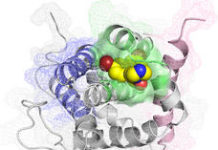The use of infigratinib, the FGFR1–3 tyrosine kinase inhibitor in a 66 year old man with a phosphaturic mesenchymal tumour bearing the FN1–FGFR1 fusion gene was reported in a letter to the editor on 9 September 2020 in The New England Journal of Medicine. Biochemical and structural response to the treatment with infigratinib confirms the role of FGFR1 signalling in phosphaturic mesenchymal tumour growth and FGF23 production.
Tumour-induced osteomalacia is a rare paraneoplastic syndrome caused by excessive secretion of FGF23 by a phosphaturic mesenchymal tumour. Through FGFR1 signalling, FGF23 decreases renal phosphate reabsorption and 1,25-dihydroxyvitamin D production. Hypophosphatemia as a consequence causes rickets, osteomalacia, bone pain, muscle weakness and fractures.
Tumour-induced osteomalacia is usually cured by surgical resection of the phosphaturic mesenchymal tumour. When fusion genes consisting of FGFR1 and the gene encoding FN1 were identified in some phosphaturic mesenchymal tumours, FGFR1 emerged as a potential therapeutic target.
The authors described a case of the patient in whom phosphaturic mesenchymal tumour was diagnosed at the age of 42 years. The tumour persisted despite multiple surgeries. Lung metastases were diagnosed at age 56 and at age 61 the patient had widespread superficial and visceral metastases.
The treatment with infigratinib was started in the context of a clinical trial. The immediate response (within 24 hours) was recorded with decreased level of FGF23 which was after 2 weeks within normal values and the phosphate level elevated. Imaging revealed regression of metastases. With treatment, progressive calcification of several soft tissue lesions was observed. Pre- and post-treatment biopsies of one lesion revealed that a previously sarcomatous tumour had been replaced with lamellar bone, a finding consistent with metaplastic transformation.
Due to side effects, infigratinib has been discontinued after 18 months. The patient continued the treatment with nivolumab and ipilimumab in the context of a clinical trial, but this treatment was not effective. The FGF23 level continued to increase and metastases were widespread. Severe aneamia was treated with a transfusion. Granulocyte-colony stimulating factor–mediated paraneoplastic neutrophilia also developed.
Infigratinib was reinitiated 28 months after the previous discontinuation. The FGF23 level decreased again rapidly and imaging showed improvement. The side effects required intermittent dose interruptions. The disease progressed 10 months after resuming therapy and 5 years since the initiation of treatment with infigratinib, the patient died.
Infigratinib as a treatment for unresectable or non-localised phosphaturic mesenchymal tumours is currently evaluated in the NCT03510455 study.
Reference
Hartley IR, Miller CB, Papadakis GZ, et al. Targeted FGFR Blockade for the Treatment of Tumor-Induced Osteomalacia. NEJM; Published online 9 September 2020. DOI: 10.1056/NEJMc2020399.





